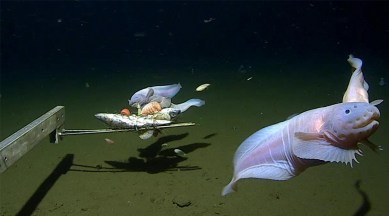
[ad_1]
The snailfish, of the Pseudoliparis belyaevi species, are the primary to be caught beneath 8,000 metres, the expedition stated.

Fish have been caught greater than 5 miles (8 kilometres) underneath the floor of the ocean for the primary time ever – and filmed even deeper – by a joint Japanese-Australian scientific expedition.
You have exhausted your
month-to-month restrict of free tales.
To proceed studying,
merely register or check in
Continue studying with an Indian Express Premium membership beginning Rs 133 per thirty days.
This premium article is free for now.
Register to proceed studying this story.
This content material is unique for our subscribers.
Subscribe to get limitless entry to The Indian Express unique and premium tales.
This content material is unique for our subscribers.
Subscribe now to get limitless entry to The Indian Express unique and premium tales.
The expedition’s chief scientist, Professor Alan Jamieson, stated on Monday that two snailfish have been caught in traps set 8,022 metres underwater within the Japan Trench, south of Japan, throughout a two-month voyage by a group from the University of Western Australia (UWA) and the Tokyo University of Marine Science.
The snailfish, of the Pseudoliparis belyaevi species, are the primary to be caught beneath 8,000 metres, the expedition stated. It wasn’t instantly clear how massive the fish have been, however the species has been recorded as reaching a size of near 11 centimetres (4.3 inches).
Remotely operated cameras lowered from the DSSV Pressure Drop by the joint expedition, a part of a 10-year examine into the deepest fish inhabitants on the planet, additionally recorded an unknown snailfish species swimming 8,336 metres deep within the Izu-Ogasawara Trench off southern Japan.
“The Japanese trenches were incredible places to explore; they are so rich in life, even all the way at the bottom,” stated Jamieson, founding father of the Minderoo-UWA Deep Sea Research Centre.
“We tell people from the very early ages, as young as two or three, that the deep sea is a horrible scary place that you shouldn’t go and that grows with you with time,” stated Jamieson.
“We don’t appreciate the fact that it (the deep sea) is fundamentally most of planet Earth and resources should be put into understanding and how to work out how we are affecting it and how it works.”
[adinserter block=”4″]
[ad_2]
Source link